HIT CHANNEL EXCLUSIVE INTERVIEW: November 2024. We had the great honor to talk with an extremely talented guitarist and singer: Gary Myrick. He is best known for his hit single “She Talks in Stereo” (1980) and “Message Is You” (1983), which was being played very often by MTV. He wrote songs and performed on John Waite’s hit album “No Brakes” (1984). He replaced Stevie Ray Vaughan in Krackerjack and formed Havana 3am supergroup with The Clash bassist Paul Simonon. He has also collaborated with Wilson Pickett, Jackson Browne and Steve Jones (Sex Pistols guitarist) and many others. Gary recently released “The Sum of All My Sins” EP, produced by Stevie Wonder producer Robert Margouleff. Read below the very interesting things he told us:
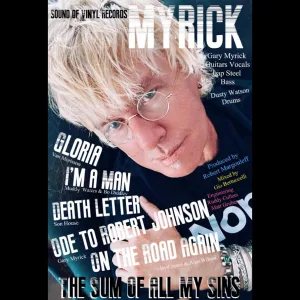 Could you please give us some very basic information about the making of “The Sum of All My Sins” EP?
Could you please give us some very basic information about the making of “The Sum of All My Sins” EP?
Well, I had wanted to do this for a while and I am friends with Bob Margouleff, who was the producer for Stevie Wonder in the ‘70s and he wanted to record me. So, we went into a studio and I played all the instruments on this record except for drums. I hired a drummer that I love (ed: Dusty Watson), that I’ve worked with many times and then we started recording. I would start with rhythm guitar, playing the track and singing just as a reference vocal and then I would put down another guitar as an overdub and then maybe I would do the vocals, the bass and any other sounds that I wanted to add. So, it was a really fun project because I didn’t have to think about any other musicians at all, except just the drummer and I knew that he was so good that it would be no problem. We recorded all the basic tracks in one day and then I recorded the solos, all the other guitars in that same day. So, it was an incredibly easy and simple way to record and there were no drum machines, just what we call “rubato”. Rubato is where the music goes a little faster, goes a little slower. In dance music, for example, there is a drum machine and it’s always: “dun-dun-dun”, the same thing, over and over and that doesn’t slow down. My favorite music in blues, rock ‘n’ roll, really any kind of music, even classical music, slows down and speeds up, depending on the solo or the atmosphere that is trying to be created. So, that’s the way we did it. There were no drum machines or anything like that.
“Ode to Robert Johnson” is the only original song from “The Sum of All My Sins” EP. What is the story behind this song?
I’m from Dallas, Texas, born and raised in Dallas. First of all, I love this music and he recorded the majority of that one album (ed: “King of the Delta Blues Singers” -1961) in Dallas, Texas, my home town and I‘ve been in the room where he recorded it and it’s in downtown Dallas. I thought that Robert Johnson needed an ode, so, I said: “I’m gonna write an ode for Robert Johnson” and I’ve done it twice, actually. I recorded it electric on “The Sum of All My Sins”, but I also recorded it on 12-string acoustic on another record that I made during the pandemic (ed: in 2021) that nobody has heard much, because I didn’t really promote it, but it’s out there, it’s available and it’s called “Forever (Adventures in 12 String)”. If you like “Ode to Robert Johnson”, you should hear both versions, because it’s the same song but one it’s completely acoustic 12-string and vocal only; no band. Then, the other one is of course very electric.
I really like your acoustic cover to “On the Road Again” (Canned Heat) from “The Sum of All My Sins” EP. Please tell us a few words about this version.
I’m a guitar player, so, I love electric but I also love acoustic. I play slide lap steel also on acoustic and electric. I needed a fifth song and I had already recorded “On the Road Again” on that 12-string album and it’s the first song on “Forever (Adventures in 12 String)” and everybody seemed to like that song a lot and I love that song. It’s an old Canned Heat song from the 1960s, so, really it hasn’t been re-recorded in 50 years. I wanted to do the song and I knew that I could put my own stamp on it, you know, I could do it my way. So, I did it all on 12-string and then we added it to the electric on “The Sum of All My Sins”, because we needed a fifth song and right now they are talking about possible Grammy or something, I don’t know, but that’s what my manager says. But they needed five songs to do that, so, we just added that song and it’s funny that that song, which it totally blew my mind, went to the #1 spot in about 7 radio stations in the UK, so, I was shocked. I thought: “Wow! You mean I could get actually a #1 song playing just 12-string and vocal; no band?” So, that totally blew my mind and I was very happy that that could be. I think that says a lot about the love of truth in music today, because there are a lot of things that are not truthful enough for the audience. But 12-string and vocal, it doesn’t get more truthful than that.
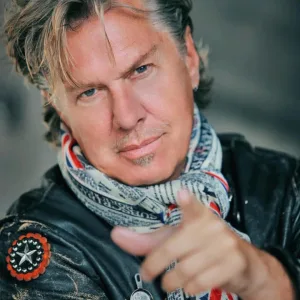 Why did you decide to cover those particular songs on “The Sum of All My Sins” EP?
Why did you decide to cover those particular songs on “The Sum of All My Sins” EP?
Well, I just love them and I knew that I could do them different. So, on the electric ones I knew that I was gonna make them heavier, much heavier, and the guitar much heavier and I felt like I had something to say with some other songs. You know, they were good in their original versions and I like them, don’t get me wrong, but I just thought they could be stronger.
How important was the contribution of legendary producer Robert Margouleff (he produced Stevie Wonder’s “Innervisions” and “Talking Book” albums including the song “Superstition” and Devo’s classic song “Whip It”) in “The Sums of All My Sins” EP?
Well, Robert is an old friend of mine and he and I wanted to do this for a while. He produced my third album in the ‘80s (ed: “Language” -1983), so, I knew him and we talked about it. In fact, we talked about that rubato thing; no drum machines. We didn’t want drum machines and I wanted to capture that kind of blues vocal that’s really dry, not a lot of reverb, not a lot of echo on the vocal, because I love that in blues like from the 1930s; that kind of vocal. I wanted that and he totally understood that. So, Bob Margouleff is really great at audio, he knows how to capture things in audio, because he has great experience. You know, he did all that early Stevie Wonder stuff in the ‘70s that I mentioned earlier, he did “Innervisions” (1973), maybe the best Stevie Wonder record, he did “Talking Book” (1972), incredible! That’s an incredible record. So, based on his experience and knowledge, I knew he’d be helpful in my quest.
Could you give us some details about the MPH project with Doug Pinnick (King’s X -bass, vocals) and Mike Hansen (Albert Lee, Davy Knowles -drums) ?
Oh, yeah! The band King’s X, used to play some of my songs when they first started and I met them somewhere, I think at a club in Los Angeles and they were telling me how much they liked my music and this and that. Then, the bass player asked me if we can record together sometime and I said: “Sure”. So, we got together, we decided to record just four songs and we liked each other’s musicianship, I liked Doug’s playing and Mike, the drummer. So, we just decided to do it. It was very off-the-cuff, no record company, no managers, we just went in and recorded and we put it out. We didn’t promote it, we didn’t do anything. We said: “Oh, ok, I like that. Put it out”.
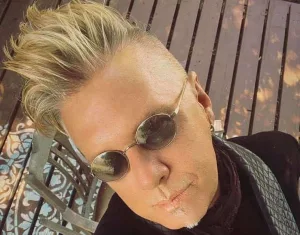 The name of your record label is Sound of Vinyl Records. Are you happy with the comeback of the vinyl records?
The name of your record label is Sound of Vinyl Records. Are you happy with the comeback of the vinyl records?
I love it. Let’s face it, we’ve tried everything: We had CD’s… I do love cassettes, too. I think cassettes are fucking great, excuse my language. I love vinyl and vinyl has a sound; there is a sound that’s the compression of the audio somehow and I knew that and I wanted that. Most of my albums were recorded analog, not digital and then if there were put on to a CD or something like that, that gives it a digital thing. I have about 11 albums and most of those records were analog recordings to tape, to actual tape. So, I have a love for it and I said: “This is my label”. I mean, anybody can start a record label, it’s not a big deal. So I wanted to put my record out and I said: “’The Sound of Vinyl Records’, that’s what I want (laughs). That’s what I want. Ok, that’s it. It’s the Sound of Vinyl Records, that’s what I want to get, that’s what I’m trying to get”. That’s it.
Did you expect the commercial success of “She Talks in Stereo” single from the debut album of Gary Myrick & the Figures in 1980?
You never know. Nobody knows. The record company doesn’t know, the musicians don’t know, you just have to do what you like. What do you like? Do that! It’s simple: Do what you like. That’s what I did. I just did what I liked and that song is still doing well, to this day. I didn’t know, but the record company liked it a lot. They did say at the time: “We really like ‘She Talks in Stereo’” and I said: “Ok, great”. So, I recorded it and to this day is doing well.
Your songs such as “Message Is You” (from “Language” -1983) were being played by MTV in the ‘80s quite often. How helpful was MTV for your career?
I think it was very helpful. I love visuals, see, I’ve done all the artwork on all of my covers, all the cover art I did, so, I’m into visuals too. On the new record I did two videos that are on Youtube that I filmed and directed and I did it all on an iPhone. That’s all I used: iPhone and they turned out pretty amazing, I was pretty happy. I like visuals, so, MTV at the time was very-very helpful. There was a VJ, Nina Blackwood, she was one of the big VJs on MTV and she and I are still very good friends and she played the heck out of my stuff.
Does “Live In Texas 1980” live album capture the real atmosphere of a Gary Myrick & The Figures concert from that period?
Definitely, yeah. Actually, somebody gave me that recording and I thought: “That’s Gary Myrick & The Figures. That’s what it really sounds like and what it really was”. So, I put it out and I put it out on my label, on Sound of Vinyl Records and I’m very happy with that.
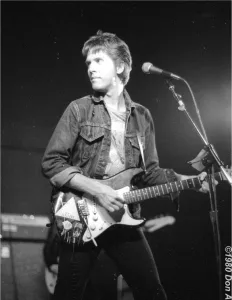 You formed Havana 3am supergroup with Paul Simonon (The Clash -bass) and Nigel Dixon (Whirlwind -vocals) in 1986. How did this band come together?
You formed Havana 3am supergroup with Paul Simonon (The Clash -bass) and Nigel Dixon (Whirlwind -vocals) in 1986. How did this band come together?
We met in Los Angeles. Paul and Nigel had flown over from London to El Paso, Texas, I think they were searching for inspiration. So, they stayed in El Paso a little bit and then they bought Harleys and they rode Harleys to Los Angeles. I’ve been riding motorcycles for years and I was playing guitar with the guitar player from The Sex Pistols, Steve Jones, because he was going to do a little tour. He had a solo record that he did called “Mercy” (1987) and I was gonna back him up, playing some back up guitar for him. He had a Harley and he was riding motorcycles, too. So, we all met up one day and we were all riding bikes and we were talking about motorcycles, we didn’t really talk about music and we kept doing that. Then, one day they said that they were thinking about starting a band. They knew that I was a musician and I said: “Why don’t we try to write three songs and see how it comes up. If we like it, great. If we don’t, that’s ok” and then we did. So, we wrote three songs and one of the songs was “Reach the Rock”, which ended up being the single and then we put that on hold for a while. They went back to England and then they called me one day and said: “Could you come to England and write some more songs?” and I said: “I’d love to”.
So, I went to England, I got a place to stay and we started writing songs every day. Then, all of a sudden, we were asked to go on a tour, so, we started touring Europe, but we didn’t have a record out, no record. We could tour because of The Clash connection and Paul and people wanted to come see us, so, we did that, it turned out really good, we had a great time and it sounded good. In fact, there was a live performance of us playing in London on Youtube that I just love, I think it sounds great. We were actually doing a Clash song just at the end of the show, just for fun, “The Guns of Brixton”. Then, all of a sudden we were asked to go to Japan and a record company in Japan asked us to make the album and they would just sell it in Japan only. We could keep the master recording and we could license it to another label if we wanted to, so that’s what we did. We went to Tokyo and we recorded the album with a recording engineer who could not speak any English, so, we had interpreter through the whole session, but it worked. We got it done and it was cool. We had a great time and then we played on every island in Japan. We went on a little tour of Japan, every island and it was awesome. It was amazing.
Was it an interesting experience to play and write songs on John Waite’s “No Brakes” (1984) album?
Me and John, we were put together by a manager and we were going to make that a band and I actually gave that album to John, like a weirdo, I didn’t know why I did that. I had another solo album to do, so, we finished the “No Brakes” album and we were just gonna call it something, like “Some Weird Dudes” or something, we had to come up with a name. It wasn’t going to be a John Waite record and then I said: “I have this solo record to do and I’d like to do it, so, you can just call it a John Waite record, I don’t care”, because I have two points on the record, so I own a piece of that record and I had songs on the record, so, for all I knew, you never know what it’s gonna succeed, you never know. So, I went on to do the solo record and then all of a sudden we got a #1 song with “Missing You” and we said: “What?!” I thought: “Oh, man, why did I quit?” So, I didn’t really quit and I just said: “I just want to make that solo record”, so, I gave John that solo record. It was never a John Waite record, but that’s ok. I’m not bad about it.
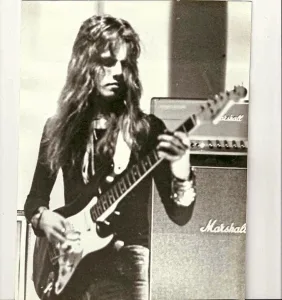 How dangerous was it to play at The Cellar club in Dallas in the ‘70s?
How dangerous was it to play at The Cellar club in Dallas in the ‘70s?
Wow! You’ve got your information, don’t you? That’s great. Well, it was fantastic. I was doing all original music at The Cellar, we were doing really well and The Cellar was the craziest place in the world. Every bouncer that worked there, had a gun, every one. One night, I was sitting at a table during a break, and a guy hit his gun on a table and it went off and it shot over my head and I said: “Dude, what are you doing? Are you out of your mind? You could kill somebody, watch what you are doing. Put that gun away!” and he did, he put it away. Girls would come up in front of the bands. There was a runway in front of the bands, so, we ‘d be playing, there was a runway in front of bands and there were pillows on the dance floor, so, everybody could lie down and watch the bands. It was crazy. The whole place was painted black, the bouncers with guns and all these girls were up and standing in front of the band dancing and we were thinking: “Oh great, ok”. So, it was a wild-wild place and it was very Texas, but it was also very racist and I didn’t like that and there were a lot of things about it that weren’t right, but it was a good place to start. We did really well there and we played the Dallas Cellar and the Fort Worth Cellar.
How did it happen to replace Stevie Ray Vaughan in Krackerjack?
It happened because I was playing The Cellar and they heard about me and Uncle John Turner, who was the original drummer for The Johnny Winter Trio had a band in Austin called Krackerjack, he came in and asked me if I would consider coming down to Austin to replace this guitar player. Of course, Stevie hadn’t made any solo records and I hadn’t made any solo records and I wanted to go to Austin because I was into the blues and I wanted to learn more about the blues and I knew that I could do that in Austin. I knew Uncle John a little bit and I thought it’d be really fun, plus they were making the most money. They were doing all original material like I was, all original blues rock and I liked that, so I went down there and I replaced Stevie. They fired Stevie and don’t ask me why, I don’t know why they did. It sounds crazy but on my resume when it says that I replaced Stevie Ray Vaughan people freak out (laughs), they say: “Really?!” and I say: “Yeah. Yeah, I did”. Stevie and I were actually very friendly and he was a very sweet guy, he was extremely sweet, very kind. We did some shows together in Midwest, we were both on Epic Records and his guitar roadie was my guitar roadie for years, so, there were a lot of things that were connected for some reason. But it was great fun and God bless him.
How much has your approach to guitar changed over the years?
I think it’s gotten wilder over time, it’s gotten a bit wilder and there is definitely a lot more blues to it as time went by. In the beginning, I was really into Hendrix and I love Jimi Hendrix and I actually met Jimi Hendrix when I was 16 years old in Dallas, so, that’s just another completely wild story. He also was extremely nice to me and I was 16, I didn’t know anything, anyhow, I met Jimi Hendrix. I really liked psychedelia in the sound but I also liked the blues, so, I went to learn more about blues and so, going down to Austin for Krackerjack was very helpful in that, but I’ve changed over the years. I got better, I think I just got better. I mean, as time goes by you learn more about different things, but I’ve been playing since I was 10 years old, so I’ve been doing this a long time and I think I’ve just learned more. I follow my instincts, what my gut tells me to do, so, that’s about it.
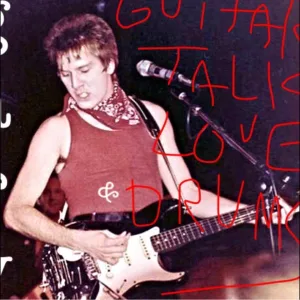 Except Jimi Hendrix who are your other influences on guitar?
Except Jimi Hendrix who are your other influences on guitar?
Duane Eddy. I love Duane Eddy stuff, I love that kind of western surf stuff which I used in Havana 3am a lot; big twangy guitars, I like that a lot. Duane Eddy was the earliest guitar player that I was listening to when I was really young. Then, I also like Jeff Beck a lot, in The Yardbirds especially. I utilize feedback now quite a bit, I really love feedback, so, as I am working on a blues riff, I often (ed: he makes a guitar noise) get feedback from the amp and things like that and really I heard that from Jeff Beck in The Yardbirds back in the ‘60s when I was a little kid.
When and how did you get to meet Jimi Hendrix?
Oh man, it was the craziest thing in the world! I was at a show, I saw Jimi Hendrix play and I was with some other kids, everybody was about 15-16 years old and we all decided after the show to go to their hotel. I don’t know why, I don’t know what the fuck we thought we were gonna do. I mean, what were we gonna do, just say ‘hi’?” It was crazy. We all went over to the Hyatt Hotel in Dallas, Texas, which was a cool hotel and we were a bunch of crazy kids, we all went to the hotel and we were just running around. We didn’t know where the band was, we didn’t know where Jimi Hendrix was, we didn’t know anything, we were just running around like: “Oh, what’s here? Hey!” It was crazy and nobody threw us out , there was no security like now, you ‘d be just immediately thrown out. But then nobody was thinking anything, we were just kids and they just let us do it. We didn’t hurt anything, we were not breaking anything or doing anything bad; we were just kids running around. So, I was with all the kids and then I just broke away from the kids and started walking down halls.
I didn’t know where I was going, I didn’t know what I was doing and I just ended up leaning against the wall and directly across from me -I mean, right across- a door opened up and Jimi Hendrix stepped out by himself, nobody else, there was no one around, no one and in the background I heard Jeff Beck’s first solo album, “Truth” (1968) was playing in his room. I could hear it and I knew it, I knew the album and Jimi stepped out and he looked fantastic, he looked just like I wanted him to be, it was the Jimi Hendrix that I thought was amazing and he said: “Hello” and I said: “Hi” and then I started talking to him and we talked for about five or six minutes, nobody around. He just stood there talking, he was the nicest guy in the world. As nice as you can imagine. I mean, he was kind and relaxed, no bad attitude, no rock star bullshit, a nice guy. He was a veteran, you know, he was in the army, he was a straight shooter. He was a good guy and a great talent, of course and I just talked to him. We had a great conversation and then all of a sudden a bunch of kids ran up and they saw us. They all ran up and they shouted (ed: in a silly way) : “Heeeyy, Jimi Hendrix!!!” They just went crazy and I wandered away, I just walked away. That was it. It was amazing, I will never forget it. I will never forget it.
You are very lucky. Could you please describe to us your feelings when you played on Wilson Pickett’s “American Soul Man” (1987) album?
Oh man, I love Wilson Pickett. God bless Wilson Pickett! I mean, I couldn’t believe that I had been hired to do it, because I was a big fan and this was also Bob Margouleff, by the way. Bob Margouleff was the producer and see, this is how far I go back me and Bob. Bob called me up and I played guitar for other people like Jackson Browne, the guy from The Sex Pistols (ed: Steve Jones -guitar), different things I had done playing guitar for other people and so Bob asked me to play guitar for Wilson and I couldn’t have been happier. I just thought Wilson Pickett had the most incredible voice and to play on his last album is such an honor, I can’t tell you. It was incredible, I really enjoyed it, I had a fantastic time and God bless Wilson Pickett.
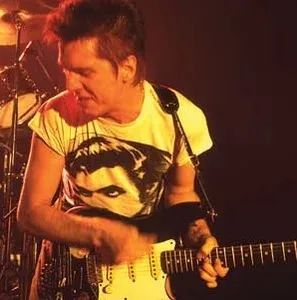 You played on Spirit’s “Thirteenth Dream” (1984) album. Was Randy California (guitar, vocals) an easy-going person to work with?
You played on Spirit’s “Thirteenth Dream” (1984) album. Was Randy California (guitar, vocals) an easy-going person to work with?
I also love Spirit and I had worked with Jay Ferguson, the singer of Spirit and we had written some songs together. In fact, you mentioned “Message Is You” and he co-wrote that with me, so, we were friends. They called me up and said: “We are gonna make a video and we’re gonna have a bunch of different guitar players playing at the same time”. I did love Randy California’s sound in Spirit, I thought that was a great sound and I heard later that Jimi Hendrix also liked Randy California (ed: they both played in Jimmy James and the Blue Flames in the ‘60s) and I went down and we recorded a video live for “I Got a Line on You”.
A huge “THANK YOU” to Mr. Gary Myrick for his time. I should also thank Mr. Mike Gormley for his valuable help.
Official Gary Myrick website: https://www.garymyrick.com/
Official Gary Myrick Facebook page: https://www.facebook.com/garygmyrick

